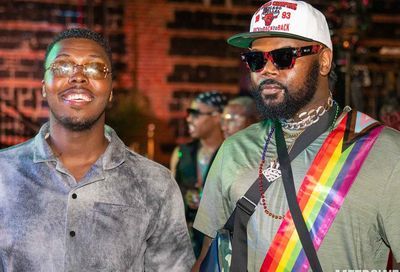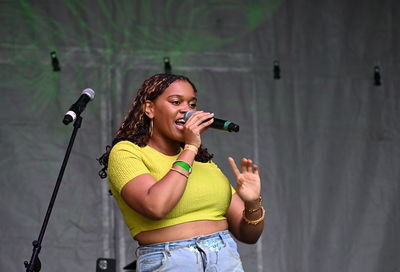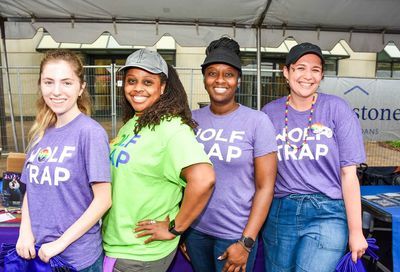OutWrite 2023 Celebrates Modern LGBTQ Literature
Our annual celebration of The DC Center's OutWrite Literary Festival, featuring works from its LGBTQ writers and poets.
![]()
What’s on Emily Holland’s nightstand?
“I always have a few books I’m working through,” says the chair of OutWrite, The DC Center’s literary festival, held annually in August.
“I’ve been on a bit of a romance kick lately and am currently reading a queer romance called Love at First Set. It’s a nice kind of bedtime read. I’m also reading a book of poetry called Toska by Alina Pleskova, a writer based in Philadelphia. So I try to have at least one maybe larger book, and then one poetry book to keep me nourished.”
Nourishment, of course, comes in many forms — but there is nothing quite as uniquely satisfying as literary nourishment. Whether it be poetry or prose, pulp fiction or highbrow essay, thousand-page biography or slim, illustrated narrative, words power our lives, spark our imaginations, inflame our hearts, fire our passions, complete our souls.
Meanwhile, the art of reading has become, in these days of future technologies, an act of absurd convenience. We get our books in an abundance of ways — from the traditional hard-covered tomes that crowd the shelves of our homes to the vast “libraries” we tote with us at all times on our Kindles and phone apps, to the audiobooks, played from our watches, that accompany us on walks and commutes.
Holland, who teaches creative writing at George Washington University and works at the Bethesda-based literary non-profit, The Writer’s Center, where she edits Poet Lore, America’s oldest poetry journal, is partial to the tangible experience.
“When I’m holding the book,” she says, her voice gentle and soothing, “it’s like this artifact where there’s a world being built. I love the tactile nature. I try to annotate books if I really love the language and I want to kind of break it down. And something about having that physical interaction — it almost makes it feel like I’m as close to the author as maybe I can get, or as close to how the author was maybe in their own creation, printing out drafts at their desk.”
This year’s OutWrite, which will be held from August 11 to 13, will once again be fully virtual (and free to attend). There was a brief glimmer of hope that it would revert to an in-person event this year, but The DC Center’s forthcoming, gorgeous new space is still undergoing construction. So it will be one more year of online workshops, symposiums, readings, and panel discussions. Which suits Holland just fine.
“It gives us access to viewers all over the world,” says the 29-year-old. “And we had some people able to expand their panels with new people who maybe couldn’t travel to come to the area too.
“People can expect a wide variety of genres,” she continues, detailing the weekend. “We have poetry events, speculative fiction events, some really fun workshops on writing based on arts or film or music, and a workshop on the queer love letter. We can expect to kind of dive into history through panels on writing through the AIDS crisis, going into queer bar histories, and of course, the history of writing through the present day.
“Overall I’m feeling very excited and energized, especially in the face of the current political sphere and all the negativity that seems to be coming our way.”
That negativity is well-known in the LGBTQ community, with school libraries across the nation instituting book bans, unceremoniously yanking LGBTQ books off shelves for “inappropriate content,” in an effort to, as shallow-minded conservatives proclaim, “protect our children.” The movement hasn’t hit too many mainstream libraries yet, but if it’s not stopped, and soon, it’s not far-fetched to imagine that books with even the most fleeting LGBTQ content will find their way into a bonfire.
Perhaps that’s an extremist, pessimistic outlook, but LGBTQ writers — and readers — are on guard. The way to combat the bans, apart from political apparatus and the courts, of course, is for LGBTQ authors to continue producing LGBTQ content, volumes of it, in an effort to celebrate, exalt, commemorate, enshrine, and uplift our community.
“We’re seeing queer writers really tell their stories in their own ways and make a stand and say, these are queer books for readers,” says Holland. “And not everything is necessarily going to be legible to the ‘most popular audience,’ or where the publishing world sees their most popular audience as kind of straight cisgender readers. It’s very disheartening to feel like, in some ways, that society is moving backward, when we really have such a vibrant queer literary landscape that I think is doing some of the most exciting work in literature these days.”
You’ll find a handful of those LGBTQ writers on the following pages. Since 2018, Metro Weekly has asked OutWrite participants — authors, panelists, and workshop leaders — to submit examples of their prose and poetry, from which we curate a reader’s buffet. Think of it as an appetizer to next weekend’s main course.
Holland puts it best: “The idea behind OutWrite is to support queer writers by giving them a platform to share their work, share ideas, and be in community with each other. And I also think that it is a community-building event, something that brings us together, even in a virtual space as we’ve done for the past couple of years now, and reminds us that we’re here, we’re still telling our stories, and we’re still thriving in an atmosphere that doesn’t want our voices to be heard or to be shared.”
OutWrite 2023 runs from Friday, Aug. 11 to Sunday, Aug. 13. All events are free and open to the public. For a full schedule of events, or to register, visit www.thedccenter.org/outwrite.
Poetry by Brandon Blue, KB Brookins, Dustin Brookshire, Alex Carrigan, Jason Crawford, Sofia Fey, Catherine Gewertz, Sylvia Jones, Bonnilee Kaufman, Rona Magy, Caly McCarthy, Caridad Moro-Gronlier, Steven Riel, Kim Roberts, noemi rose, and Gregg Shapiro
Fiction by Curtis Chin, Greg Herren, Renee James, Jeffrey Dale Lofton, Charles Rice-Gonzalez, Carla Rachel Sameth, and Addie Tsai
Support Metro Weekly’s Journalism
These are challenging times for news organizations. And yet it’s crucial we stay active and provide vital resources and information to both our local readers and the world. So won’t you please take a moment and consider supporting Metro Weekly with a membership? For as little as $5 a month, you can help ensure Metro Weekly magazine and MetroWeekly.com remain free, viable resources as we provide the best, most diverse, culturally-resonant LGBTQ coverage in both the D.C. region and around the world. Memberships come with exclusive perks and discounts, your own personal digital delivery of each week’s magazine (and an archive), access to our Member's Lounge when it launches this fall, and exclusive members-only items like Metro Weekly Membership Mugs and Tote Bags! Check out all our membership levels here and please join us today!


























You must be logged in to post a comment.